Do you want an early hotel check-in? Here's what is happening behind the scenes.
Joy Felicitas’ bed-making skills are an art form.
Moving swiftly, Felicitas pinched the pillows in half with her forearm so they slid smoothly into the pillowcase. She flung the double-sized mattress up as if it didn’t weigh over 50 pounds and tucked the sheet under. She folded the topsheet at the foot of the bed, allowing extra room for taller people. She slipped the comforter into the duvet cover without a hitch. The final touch was a few hot water spritzes to smooth out wrinkles. It was over in the blink of an eye.
Then again, Felicitas has made hundreds of beds in her lifetime. As one of over 100 housekeepers at the Four Seasons Resort Oahu at Ko Olina in Hawaii, Felicitas is part of what is often a hotel’s biggest – and arguably, most important – department.
Most people know housekeepers to spruce up our room daily, sometimes even at night for a turndown service. But behind the scenes, housekeepers do much more to ensure guests have the seamlessly luxurious experience expected on vacation through grueling labor.
Housekeepers not only accommodate specific guest requests, like using eco-friendly cleaning products, as they clean, but they also anticipate unexpressed needs, like providing extra towels if there’s a family with young children, according to Felicitas. They are also responsible for cleaning any trace of a previous guest before the next one arrives.
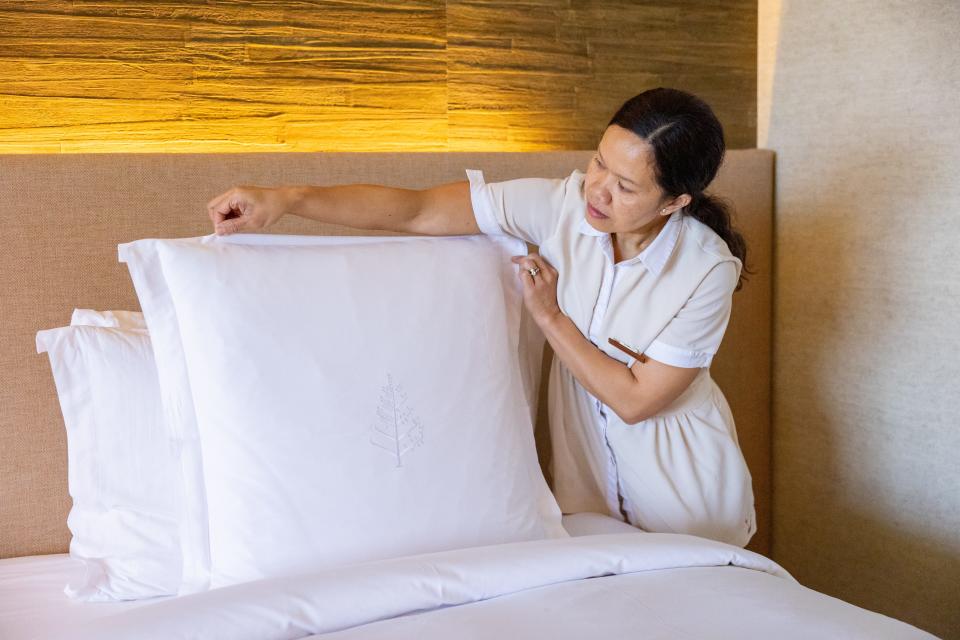
Their work touches every single department in a hotel, from washing coats for the chefs to keeping public areas immaculate. And they do this all without guests noticing.
“We’re the silent team people never see,” said Terry Marks, senior director of housekeeping at the Four Seasons Resort Oahu at Ko Olina. “We’re able to communicate with the guests through our work, our actions.”
Ever wanted to ride an airport bag belt? You can't, but we can show you where they go.
How intensive is housekeeping?
Felicitas makes bed-making look easy, but housekeeping is back-breaking – and often unappreciated – work.
To get rooms to pristine condition, not only are housekeepers cleaning everything – from the shower curtain to each window shutter – they’re also making sure the pillows stand up nicely and phone-charging cords are neatly coiled. Then there’s pushing the supplies cart that can easily weigh over 60 pounds from room to room. (The Four Seasons replaced the heavy carts in 2016 with smaller wagons that are lighter and easier to maneuver and don’t damage the carpets.)
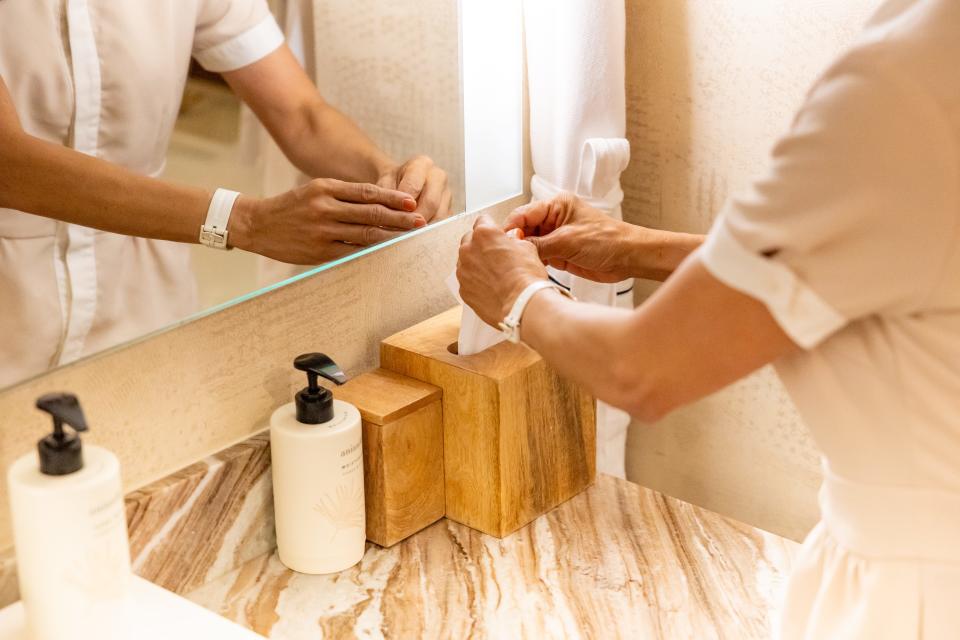
“Hello, the amount of steps they get each day, having to lift the beds and the mattresses, going back and forth to the bathroom, you have to get down on your hands and knees to scrub the floor, the showers and they do it right … You give them the time to take care of these, but yeah, it’s a very tough job,” Marks said.
What many people don’t know is housekeepers are also strategizers.
“Housekeeping, we would clean rooms, and so they weren’t considered a skilled worker,” Marks said. “COVID is really one of the areas that brought to light how important housekeeping is, and they need to be intelligent.”
Typically, housekeepers are assigned a specific timeframe to clean each check-out room to prepare for a new guest, based on data gathered by each resort. At the Four Seasons Resort Oahu at Ko Olina, a guest room featuring double beds is granted 73 minutes for turnover.
Since housekeepers manage the same sets of rooms, they take ownership. If check-out is the following day, they can prep the room as best they can the day before, so turning over the room is a little faster, Marks said. They also make sure their carts are properly supplied so they can avoid going back and forth to the linen closet, filled with fresh linens and amenities, on each floor to avoid running back to the housekeeping department.
However, things don’t always run smoothly. If there’s a family with kids versus a couple or an early check-in, it can be a time crunch to get the room cleaned to standard. “Expect the unexpected,” said Sonia Hara, a housekeeper of 18 years at the Hilton Hawaiian Village, Oahu’s largest resort with 700 workers in the housekeeping department and part of the Local 5 union, which advocates for better working conditions and equitable pay.
At the start of each day, Hara does mental math to see how many linens and new shower curtains she has to add to her cart to be efficient, although that can result in a heavy cart. To finish her 12 rooms in time, Hara often ends up skipping lunch. “Sometimes it’s a really hard job,” she said.
The demanding labor can also take its toll. Hara has gotten injured while working, like when a guest turned off the bathroom lights and she slipped on spray-on sunscreen that was all over the floor. She also went to physical therapy for six months after pushing the heavy cart caused her back to “become crooked.”
Despite the physically taxing work, Hara is proud. “I take pride in my work and I love what I’m doing.”
Do housekeepers pay attention to guests’ behavior?
Housekeepers also read their guests. They take mental notes of a guest’s behavior, like if someone typically sleeps in, they’ll start coming to clean their room later. They also look at “visual signals,” as Marks puts it. “So this gentleman, every time you know, I put the hairdryer back, they move it back over to the right, so I'm going to start leaving it on the right, and increase his consistency.”
At the Four Seasons, housekeepers cater to guests' needs before they even realize it. It can be as small as leaving distilled water in a room if someone uses a CPAP to sleep or slipping a bookmark into an open book. “We go into the rooms a lot of the times without seeing the actual guests, we're being invited into their home away from home,” Marks said.
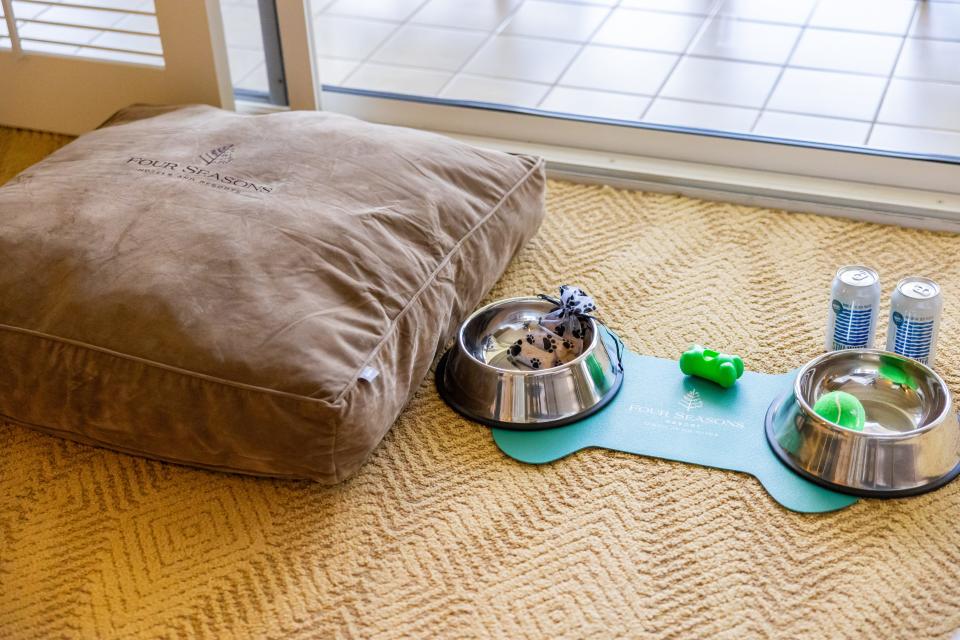
How is the hotel kept clean without guests noticing too much?
To keep an entire resort with 370 guest rooms, for example, and multiple public areas looking unblemished, the behind-the-scenes at a resort like the Four Seasons Resort Oahu at Ko Olina is a massive operation. Over 100 housekeepers are managed by a team of three supervisors, who worked their way up from housekeeper. Public attendants take care of common areas, like lobby restrooms. House attendants help run items for housekeepers or to guest rooms, like an extra toothbrush.
Down the service elevator, the basement of the Four Seasons is where the office for the housekeeping coordinators. The team of three coordinators is on until 11 p.m. They’re the ones who answer when you call for an extra pillow and manage the cleaning schedule for all the housekeepers, including figuring out late check-out and early check-in. Housekeepers are in constant communication with the coordinators. At the Four Seasons, the coordinators use iPod-like devices to stay in touch and heat sensors to tell if a guest is in the room or not.
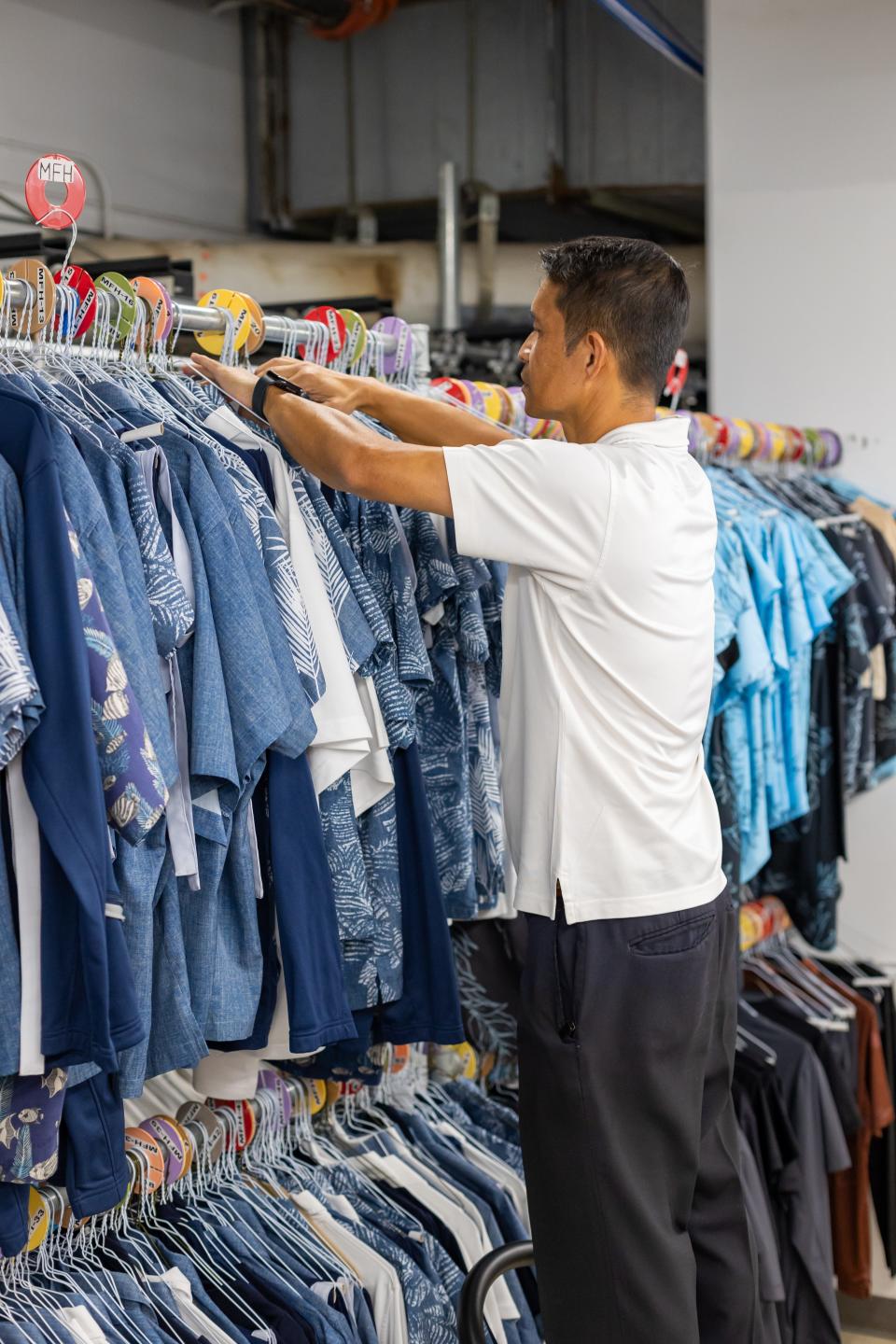
“In my humble opinion, (housekeeping) is the most important department,” Marks said. “You can’t check guests into rooms if they’re not clean ... We’ve got to be on our game, making sure we’re communicating properly.”
Turning the corner of the Four Seasons’ downstairs housekeeping department are towering stacks of boxes containing hundreds of linens. The tremendous amount of linens the resort goes through are outsourced to a third-party washer and returned the next morning. There are also shelves of linens washed in hypo-allergenic detergent.
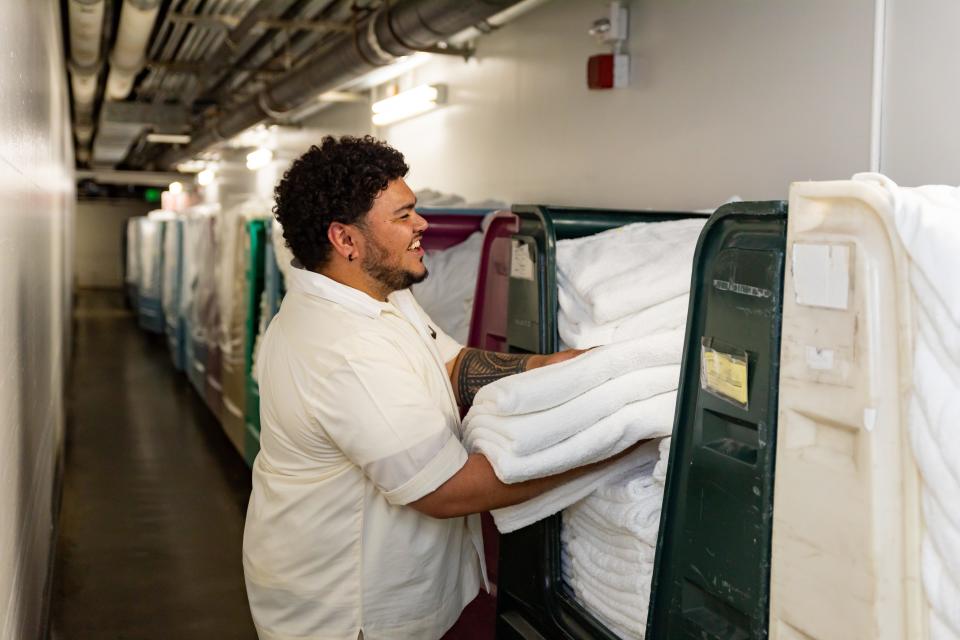
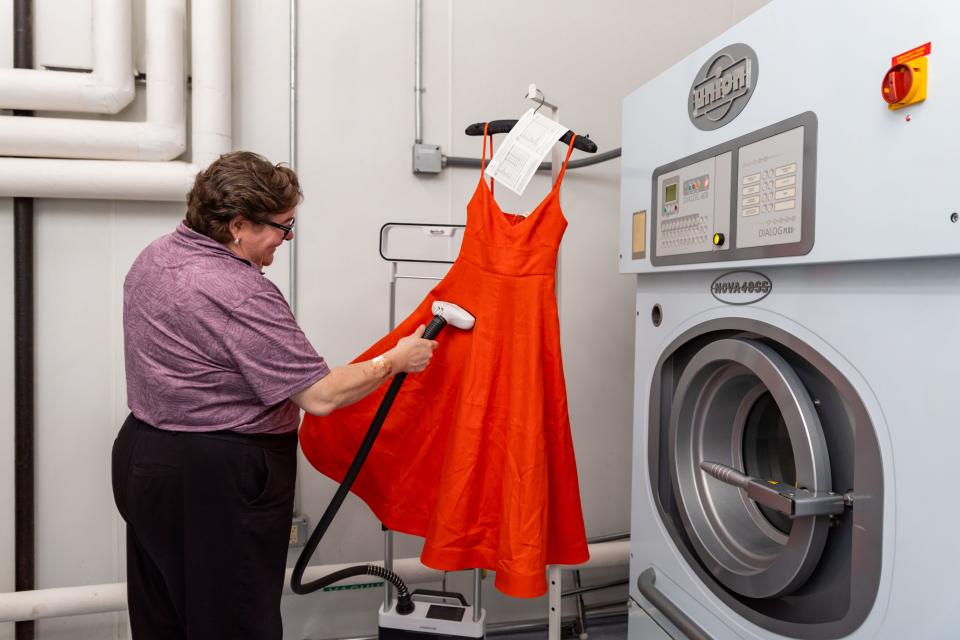
Then there’s a giant chute that the dirty towels and bedsheets changed out by housekeepers from each floor empties into. One worker sorts through the hulking pile all day, wearing heavy-duty gloves in case something sharp is caught in the sheets.
How can we be better hotel guests?
Besides trying to keep their room somewhat orderly, there are a few ways hotel guests can help make their housekeeper’s role easier. Hara prefers her guests opt into daily housekeeping to make her check-out days faster, and that the “Do not disturb” sign can sometimes throw her schedule off.
Communication is also key. Letting the hotel know a preferred time for daily housekeeping and turndown service can help housekeepers stick to their schedules. It can also give guests the best chance for early check-in and late check-out.
Hotels try their best to accommodate late check-out and early check-in, even turning over a room in 60 minutes or less at the Four Seasons (which may include a supervisor or second housekeeper being called in to help). The more information guests can give the hotel before arrival, the better, Marks said, to allow the coordinators to go through arrival times and prioritize cleaning schedules. Sometimes, if there are too many check-ins, it just isn't possible.
Taking the time to get to know the housekeeper also goes a long way, not only in making their job easier but also because of the pride they take in their work. Hara loves it when her guests interact with her or leave thank-you notes. Some guests even request certain housekeepers or rooms because of the housekeepers. (On that note, consider sending a quick email to the hotel to give kudos to the housekeeper, which Hara said is “very uplifting.”)
“That's really the thing; the people who are here really care about the guests,” said Marks. “And it amazes me just how much they do interact, and the comments that I get from the guests that’s ‘I felt like family... Joy, or whoever it was, you know, really took care of us.’”
Kathleen Wong is a travel reporter for USA TODAY based in Hawaii. You can reach her at [email protected].
This article originally appeared on USA TODAY: How does late check-out work? Here's how hotel housekeeping works
